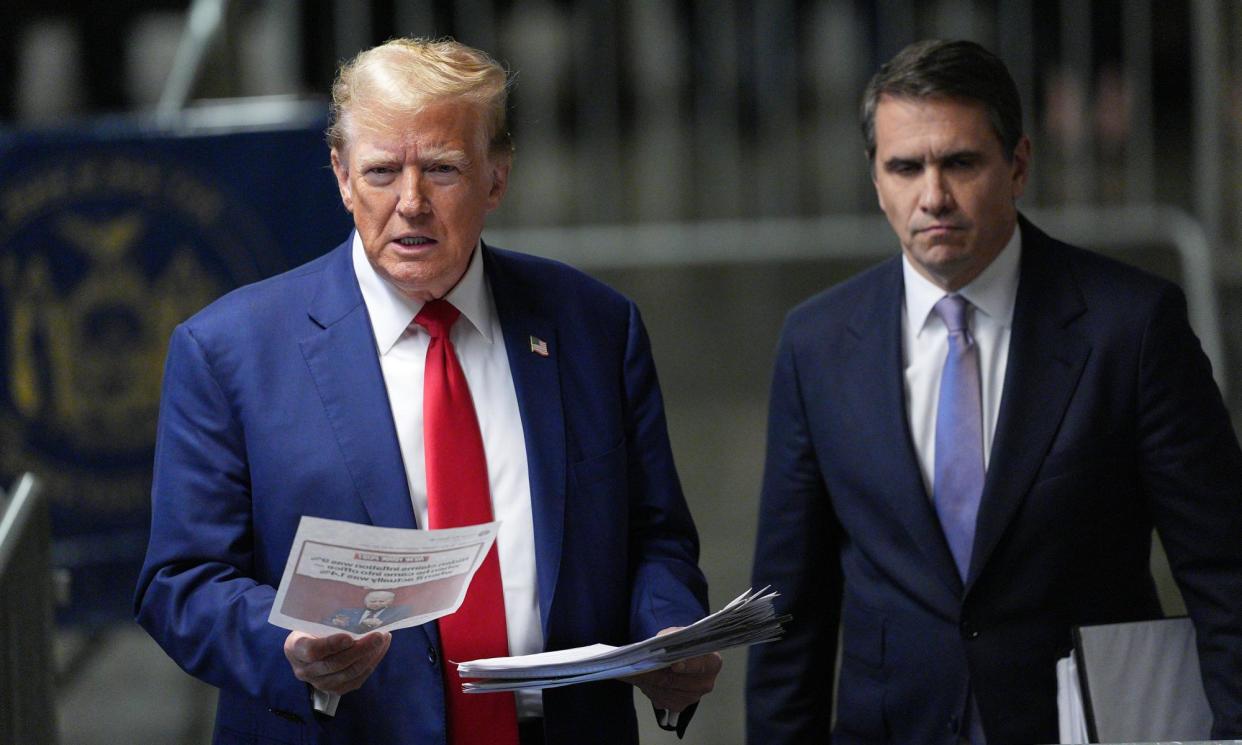Text messages with Enquirer editor: Trump trial key takeaways, day 15

Donald Trump returned to the Manhattan courthouse on Friday, marking his 15th court appearance in his historic hush-money criminal trial.
Friday’s court session, which featured a handful of custodial witnesses who provided more technical supplements to testimony or evidence, followed several days of testimony involving the adult film star Stormy Daniels, who testified in lurid detail about her alleged sexual affair with Trump.
Here are the key takeaways:
Defense paints Trump as a distracted multi-tasker
As former Trump aide Madeleine Westerhout took the stand again on Friday, Trump’s attorney Susan Necheles tried to use her testimony to frame the former president as a busy multi-tasker who had to sign “a tremendous amount of items”, which would “take up many hours of his day”.
Westerhout, once the director of Oval Office operations during Trump’s presidency, testified that Trump signed a slew of documents including proclamations, executive orders and checks.
“He liked the printed form… he felt [that] if someone was getting his signature, they would get his real signature,” said Westerhout. Necheles asked Westerhout if she ever saw Trump signing things without reviewing them, as well as when he was on the phone and meeting with people, to which Westerhout replied in the affirmative.
“He was a person who multi-tasked?” asked Necheles. “Yes,” Westerhout replied.
Necheles’s cross-examination of Westerhout attempted to frame Trump as a busy and distracted person who signed many documents without paying close attention to them, including, potentially, the reimbursement checks he signed to Michael Cohen as part of the hush-money payment made to Daniels.
Trump’s ex-aide plays into into defense’s hush-money narrative
Westerhout appeared to play into the defense’s argument of Trump being worried about the Stormy Daniels story because of his family. Westerhout, who said she had a conversation with Trump about the story, described Trump as “very upset by it”, adding: “In my understanding he knew it would be hurtful to his family.”
Asked by Necheles whether this information was based on what Trump had said to her, Westerhout said: “Um, I don’t believe he specifically said that, but I could just tell that the whole situation was very unpleasant.”
Although it was not exactly a coup for prosecutors strategically, since Westerhout testified that she could not remember Trump saying anything specific, her testimony still appeared to play into their narrative.
Although prosecutors are arguing that Trump issued the hush-money payment to influence the 2016 presidential elections, his defense team is suggesting that the payment was made because of his concerns of his family, including his wife Melania’s reaction.
Texts between Daniels’ former publicist and ex-National Enquirer editor
Another witness called to the stand today was Georgia Longstreet, a paralegal with the Manhattan district attorney’s office, whose role is to locate and save social media posts relevant to the criminal case.
In addition to asking Longstreet about various tweets by Trump – including one from August 2018 in which Trump says, “If anyone is looking for a good lawyer, I would strongly suggest that you don’t retain the services of Michael Cohen!” – prosecutor Rebecca Mangold pulled up multiple text messages between Daniels’s former publicist Gina Rodriguez and former National Enquirer editor Dylan Howard for Longstreet to read aloud. Some of the text messages have already been shown to jurors to review.
In the text messages, Rodriguez and Howard discuss Daniels wanting to publicize her sexual affair with Trump since she was yet to be paid. The texts read aloud by Longstreet include an exchange between Rodriguez and Howard in which they negotiate over prices for the National Enquirer to purchase the rights to Daniels’ story. Negotiating between $250,000 and $125,000 on 9 October 2016, they eventually settled on $120,000. In response, Rodriguez says: “Sold.”
Prosecutors’ focus on the text messages is an attempt to illustrate the chronology of the hush-money payment, as they argue that Cohen made the hush-money payment on 27 October 2016 via a shell company right before the presidential election.
